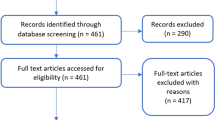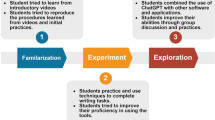Abstract
Since the introduction of task-based language teaching, tasks have become an integral component of the curriculum, ESL classrooms, and ELT coursebooks in the Philippines. Hence, this study examines the complexity of tasks in selected ELT coursebooks. Specifically, this study sought to determine the complexity features of tasks per grade level and how they progress from the simplest to the most complex within each ELT coursebook level and across grade levels. Based on the analysis, almost a quarter of the language activities in these coursebooks are tasks, most of which have complexity levels 3, 4, 5, and 6. Further findings reveal that none of the ELT coursebooks show a linear progression of task complexity within and across grade levels. Implications for ELT coursebook development and future studies are discussed.
Similar content being viewed by others
References
Bao, R., & Du, X. (2015). Implementation of task-based language teaching in Chinese as a foreign language: Benefits and challenges. Language, Culture and Curriculum, 28(3), 291–310.
Barrot, J. S. (2015). A sociocognitive-transformative instructional materials design model for second language (L2) pedagogy in the Asia Pacific: Development and validation. The Asia-Pacific Education Researcher, 24(2), 283–297.
Barrot, J. S. (2018). English curriculum reform in the Philippines: Issues and challenges from a 21st century learning perspective. Journal of Language, Identity & Education. https://doi.org/10.1080/15348458.2018.1528547.
Bell, J., & Gower, R. (1998). Writing course materials for the world: A great compromise. In B. Tomlinson (Ed.), Materials development in language teaching (pp. 117–129). Cambridge: Cambridge University Press.
Book Development Association of the Philippines. (2015). Charting the future of books in the Philippines: A roadmap of the book industry of the Philippines. Mandaluyong: Book Development Association of the Philippines.
Breen, M., Hird, B., Milton, M., Oliver, R., & Thwaite, A. (2001). Making sense of language teaching: Teachers’ principles and classroom practices. Applied Linguistics, 22(4), 470–501.
Brown, G., Anderson, A., Shilcock, R., & Yule, G. (1984). Teaching talk: Strategies for production and assessment. Cambridge: Cambridge University Press.
Brown, D. (2009). Why and how textbooks should encourage extensive reading. ELT Journal, 63(3), 238–245.
Candlin, C. (1987). Towards task-based language learning. In C. Candlin & D. Murphy (Eds.), Language learning tasks (pp. 5–22). London: Prentice Hall.
Department of Education. (2016). K to 12 curriculum guide for English. Retrieved June 6, 2016, from https://www.deped.gov.ph/sites/default/files/page/2016/English%20CG_0.pdf
Derwing, T., & Munro, M. (2005). Second language accent and pronunciation teaching: A research-based approach. TESOL Quarterly, 39(3), 379–395.
Ellis, R. (2003). Task-based language learning and teaching. New York: Oxford University Press.
Ellis, R. (2005). Instructed language learning and task-based teaching. In E. Hinkel (Ed.), Handbook of research in second language teaching and learning (pp. 713–728). Mahwah, NJ: Erlbaum.
Ellis, R. (2009). The differential effects of three types of task planning on the fluency, complexity, and accuracy in L2 oral production. Applied Linguistics, 30(4), 474–509.
Ellis, R. (2017). Position paper: Moving task-based language teaching forward. Language Teaching, 50(4), 507–526.
Foster, P., & Skehan, P. (1996). The influence of planning and task type on second language performance. Studies in Second Language Acquisition, 18(3), 299–323.
Gilabert, R. (2007). Effects of manipulating task complexity on self-repairs during L2 oral production. IRAL-International Review of Applied Linguistics in Language Teaching, 45, 215–240.
Günay, D., & lker Etuş, Ö. (2007). The exploration of tasks in the 4th grade ELT coursebook used in state primary schools in Turkey. Istanbul, Turkey: Unpublished course paper. Istanbul University.
Harmer, J. (2001). Coursebooks: A human, cultural and linguistic disaster? MET, 8(4), 5–10.
Hooper, S. (2009). Biological processes underlying written language acquisition. Encyclopedia of language and literacy development (pp. 1–9). London, ON: Canadian Language and Literacy Research Network.
Hutchinson, T., & Torres, E. (1994). The textbook as agent of change. ELT Journal, 48(4), 315–328.
Iwashita, N., McNamara, T., & Elder, C. (2001). Can we predict task difficulty in an oral proficiency test? Exploring the potential of an information-processing approach to task design. Language Learning, 51(3), 401–436.
Kuiken, F., & Vedder, I. (2007). Task complexity and measures of linguistic performance in L2 writing. IRAL-International Review of Applied Linguistics in Language Teaching, 45(3), 261–284.
Kuiken, F., & Vedder, I. (2008). Cognitive task complexity and written output in Italian and French as a foreign language. Journal of Second Language Writing, 17, 48–60.
Littlewood, W. (2004). The task-based approach: Some questions and suggestions. ELT Journal, 58(4), 319–326.
Mackey, A., Ziegler, N., & Bryfonski, L. (2016). From SLA research on interaction to TBLT materials. In B. Tomlinson (Ed.), SLA research and materials development for language learning (pp. 103–118). New York: Routledge.
Masuhara, H., & Tomlinson, B. (2008). Materials for general English. In B. Tomlinson (Ed.), English language learning materials (pp. 17–37). London: Continuum International Publishing.
McGrath, I. (2016). Materials evaluation and design for language teaching (2nd ed.). Edinburg: Edinburg University Press.
Mehnert, U. (1998). The effects of different lengths of time for planning on second language performance. Studies in Second Language Acquisition, 20, 52–83.
Nitta, R., & Gardner, S. (2005). Consciousness-raising and practice in ELT coursebooks. ELT Journal, 59(1), 3–13.
Norris, J. M., Brown, J. D., Hudson, T. D., & Bonk, W. (2000). Assessing performance on complex L2 tasks: Investigating raters, examinees and tasks. Paper presented at the 22nd Language Testing Research Colloquium, Vancouver, British Columbia, Canada.
Ong, J., & Zhang, L. J. (2010). Effects of task complexity on the fluency and lexical complexity in EFL students’ argumentative writing. Journal of Second Language Writing, 19(4), 218–233.
Phipps, S., & Borg, S. (2009). Exploring tensions between teachers’ grammar teaching beliefs and practices. System, 37(3), 380–390.
Pica, T., Kanagy, R., & Falodun, J. (1993). Choosing and using communication tasks for second language instruction. In G. Crookes & S. Gass (Eds.), Tasks and language learning: Integrating theory and practice (pp. 9–34). Clevedon, England: Multilingual Matters.
Richards, J. (1998). Beyond training: Perspectives on language teacher education. Cambridge: Cambridge University Press.
Richards, J. (2005). Materials development and research – Making connections. A paper presented at a colloquium on research and materials development at TESOL Convention. March 2005.
Robinson, P. (2001). Task complexity, task difficulty, and task production: Exploring interactions in a componential framework. Applied Linguistics, 22(1), 27–57.
Robinson, P. (2003). The cognition hypothesis, task design, and adult task-based language learning. Second Language Studies, 21(2), 45–105.
Robinson, P. (2005). Cognitive complexity and task sequencing: Studies in a componential framework for second language task design. IRAL-International Review of Applied Linguistics in Language Teaching, 43(1), 1–32.
Robinson, P. (2007). Task complexity, theory of mind, and intentional reasoning: Effects on L2 speech production, interaction, uptake and perceptions of task difficulty. IRAL-International Review of Applied Linguistics in Language Teaching, 45(3), 193–213.
Ruiz-Funes, M. (2015). Exploring the potential of second/foreign language writing for language learning: The effects of task factors and learner variables. Journal of Second Language Writing, 28, 1–19.
Skehan, P. (1996). A framework for the implementation of task-based instruction. Applied Linguistics, 17(1), 38–62.
Skehan, P. (1998). A cognitive approach to language learning. Oxford: Oxford University Press.
Skehan, P. (2003). Task-based instruction. Language Teaching, 36(1), 1–14.
Skehan, P. (2009). Modelling second language performance: Integrating complexity, accuracy, fluency, and lexis. Applied Linguistics, 30(4), 510–532.
Skehan, P., & Foster, P. (1997). Task type and task processing conditions as influences on foreign language performance. Language Teaching Research, 1(3), 185–211.
Skehan, P., & Foster, P. (1999). The influence of task structure and processing conditions on narrative retellings. Language Learning, 49(1), 93–120.
Skehan, P., & Foster, P. (2001). Cognition and tasks. In P. Robinson (Ed.), Cognition and second language instruction (pp. 183–205). Cambridge, UK: Cambridge University.
Slatyer, H., Brindley, G., & Wigglesworth, G. (2000). Task difficulty in ESL listening assessment. Paper presented at the 22nd Language Testing Research Colloquium, Vancouver, British Columbia, Canada.
Tomlinson, B. (1995). What dialogues can do. FOLIO, 1(2), 8–10.
Tomlinson, B. (2008). English language learning materials. New York: Continuum International Publishing Group.
Tomlinson, B. (2014). Developing materials for language teaching (2nd. ed.). London: Bloombury.
Waters, A. (2006). Thinking and language learning. ELT Journal, 60(4), 319–327.
Yuan, F., & Ellis, R. (2003). The effects of pre-task planning and on-line planning on fluency, complexity and accuracy in L2 monologic oral production. Applied Linguistics, 24(1), 1–27.
Acknowledgements
This paper has been funded by the Southeast Asian Ministry of Education Organization Regional Language Centre (SEAMEO-RELC) as part of the researcher’s research fellowship award.
Author information
Authors and Affiliations
Corresponding author
Additional information
Publisher's Note
Springer Nature remains neutral with regard to jurisdictional claims in published maps and institutional affiliations.
Rights and permissions
About this article
Cite this article
Barrot, J.S. Examining the Task Complexity in ELT Coursebooks. Asia-Pacific Edu Res 28, 469–481 (2019). https://doi.org/10.1007/s40299-019-00448-2
Published:
Issue Date:
DOI: https://doi.org/10.1007/s40299-019-00448-2




